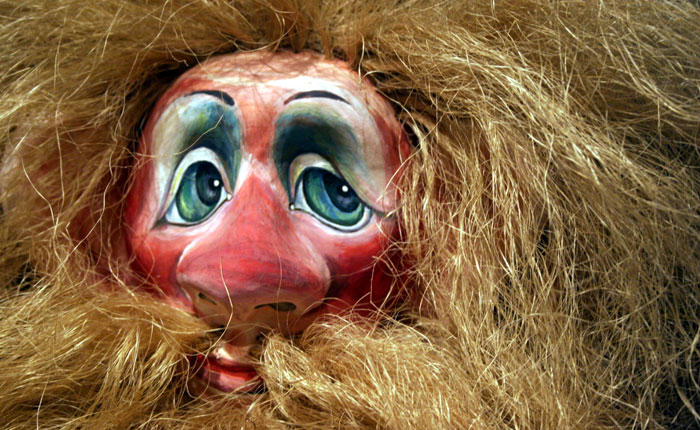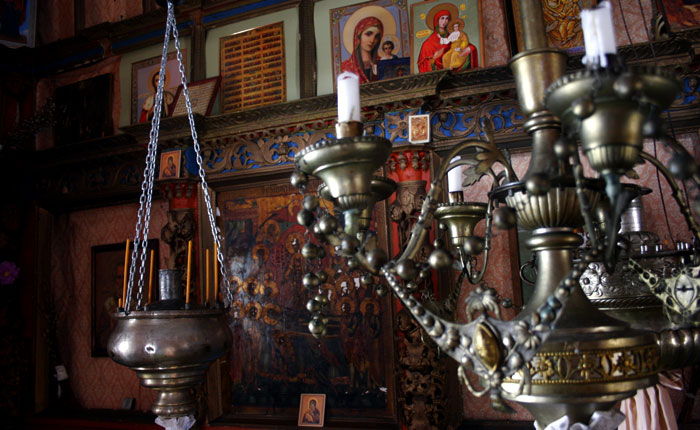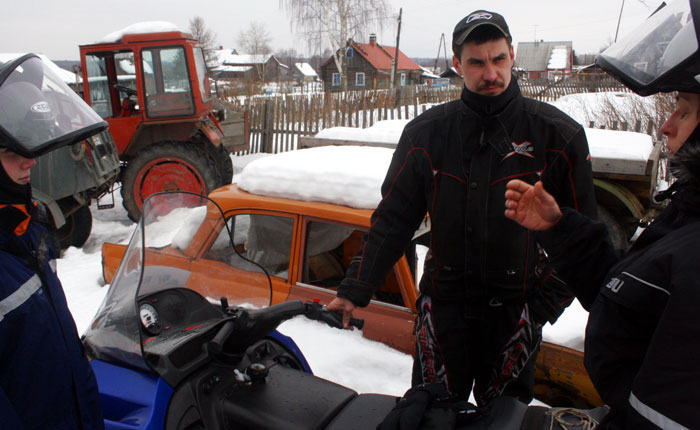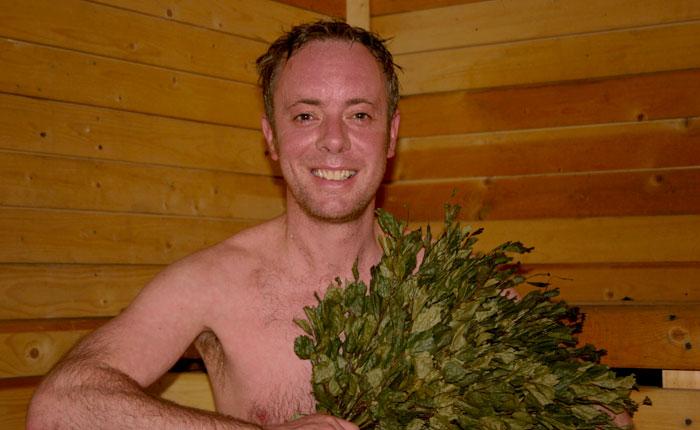It was the first turn of the day.
As I moved the handlebars, I applied a dab of throttle so the snowmobile's skids at the front would dig into the snow. And suddenly we were careering at speed straight towards a fence. Zivile, my pillion passenger, let out a high pitched shriek.
I had just long enough to realise that we were definitely going to crash, and wonder how much damage I was about to do.
Then we were on our side in a huge bank of snow, the engine screaming.
 It's important to keep all the luggage nicely centred so the snowmobile doesn't overbalance.
It's important to keep all the luggage nicely centred so the snowmobile doesn't overbalance.Karelia is a frontier land between north Russia and Finland. It's a natural paradise of pine and birch trees and deep, shimmering lakes; 60,000 of them. The Russians arrived in the 12th century, bringing Christianity with them, but unique traditions and customs remain to this day - including a language on the verge of extinction.
Locals still tell stories of ghosts that live deep in the forest. They prefer not to go out after midnight. The neck and bracelets worn by older womenfolk aren't just to look attractive; they're to ward of evil spirits with the jangling noise they make.
I discovered a Karelian spirit of my own: the sprite of the snowmobile. He sits on the handlebars and cranks the throttle when you're not looking. I turned to check Zivile was in one piece. Thankfully, she was fine. We both let out bellows of relieved laughter. The snowmobile was undamaged, we were in one piece. The fence? A total right-off for several metres. Ouch.
My journey started in St Petersburg. We left Russia's second city on a long overnight train travelling 800 miles north through snow-muffled smokescapes to Petrodavosk Karelia's regional capital. I love travelling by train in Russia. You share a four berth compartment and as myriad miles clatter past outside grimy windows you meet interesting people and see the world through their eyes.
I and Zivile my translator and fearless snowmobile passenger shared our compartment with Anya. She’d been to St Petersburg to visit friends. “You look tired,” she said. “Don’t worry I will share my energy with you.”
She’d left her 10 year old son at home with her mother and let her Soviet-style peroxide hair down for the weekend. “I went to this fantastic club called 4X,” she said. "It had all kinds of weird decorations, like pairs of women's knickers! You can dance anywhere – even on the tables!”
 The overnight train at Petrozavodsk, moody in the night time floodlights.
The overnight train at Petrozavodsk, moody in the night time floodlights.A city girl on the outside; Anya was definitely from Karelia. Seeing a picture of a brown bear in a magazine I was reading, she declared: "Bear meat has magic properties! I visited a shaman last week. He made bear stew for us," she continued. "He saved a strip of fat from the rib cage so we could keep it to rub on our chests if we feel sick. It's very powerful."
Personally I prefer my bears alive in the woods. (Though I guess rubbing bear fat on your chest makes a change from drinking Redbull if you need to keep going on the dancefloor?)
The downside with those trains is your stuff ends up everywhere. Maybe that's another Karelian spirit for my list - the one that takes everything out of your rucksack while you sleep? We fell off the train in the streetlight sodium glare of a dark winter morning. I guessed I had everything - somewhere in my bag.
Read more > Take a ride on the Trans-Siberian
The plan had been to go snowmobiling after breakfast and a shower at a nearby hotel, but the news was not good. High winds meant it would be too dangerous. So we visited the local doll museum instead. Now this wasn't the high point of the trip, but I did come face to face with several of those Karelian spirits, depicted in Hansel and Gretel-style doll-worlds. My favourite was Banyk the spirit of the bathhouse or 'banya' with his huge ginger beard and a big red nose. Banyk has to be asked for permission before having a bath and you should never take one after midnight as that's when he wants to be left alone.
 A life-sized doll of Banyk, the mischievous spirit of the banya (sauna) at the Karelian Museum of Folklore.
A life-sized doll of Banyk, the mischievous spirit of the banya (sauna) at the Karelian Museum of Folklore.That afternoon we drove into the snow-muffled countryside along fir forest lined roads to Kinerma. A scattering of tumble down wooden houses with a tiny church, it's 440 years old. And almost dead. Like many old Karelian villages it's been virtually abandoned as younger generations move to the city where electricity, hot water and all the other modern conveniences were available.
The current population count is… six. Nadezda, husband Igor and kids Yegor aged three and Vanya aged four comprise two thirds of them. Her family lived here for two generations but she too had moved to the city and only came back for a few months in summer when the weather was less harsh. "My roots are, here. I couldn't just let this little place die," she explained. Her blond hair, high cheekbones and bright blue eyes were strikingly unRussian - typically Karelian.
Boundaries on maps have little meaning when you're on the ground and the Karelia extends a good distance into Finland. After pererstroika Finnish Karelians started coming to search for traditional villages and customs which had all but disappeared in Finland. "I started doing ad-hoc tours for them around the village. Then in 1998 a Russian tour operator became interested too," she told me. "Natives of the Karelia are coming back from all over Russia to retrace their origins."
 The peaceful little church at Kinerma holds a trove of mysterious, ancient icons and candlestands.
The peaceful little church at Kinerma holds a trove of mysterious, ancient icons and candlestands.She showed us the village's tiny chapel. We stood in contemplative silence in the quiet interior. Ancient saints stared out at us, timeless icons, oddly peaceful. Next Nadezda pointed out the typical features of a Karelian house. "They're made completely from wood, traditionally without the use of a single nail," she explained. "The front section houses the family, the rear is for the animals. During winter when it gets very cold we can access the animals without having to go outside."
We stepped inside one and discovered a warm kitchen and hearty aromas. There was a huge brick oven at its centre. And Nadezdha took a blackened pot from inside and dished up steaming bowls of vegetable soup. This was followed by some of the most flavoursome stew I've tasted. The secret? No mysterious herbs, just long, long cooking time; "Beef and pork with a little salt, water and mushrooms cooked overnight," said Nadezda
 Nadezda wears traditional Karelian dress in the kitchen of her ancient house.
Nadezda wears traditional Karelian dress in the kitchen of her ancient house.Instead of stables for animals, the rear section of this house was a small museum. "I got a Finnish heritage fund to provide some money," she explained. There were old pictures of the village and most moving of all a family tree - her family tree. Tracing her ancestors back centuries, this simple device more than anything really brought home the crucial importance of her work. Here was history, tangible in her and her young children, a thread unbroken, but worryingly fragile.
As we walked back to the car I asked how the tourism business was going. "Too well!" she laughed. "this is only the second winter I've been doing tours and it's just about right. In summer we are literally too busy. We hardly have time to sleep."
It was a two hour drive next morning to Votnavolok our setting out point for snowmobiling. The wind had dropped and although unseasonably high tempeartues meant the ice was thin in places it was, apparently, still safe.
After a detailed safety briefing from Slava our guide, it was time to get kitted out. Inner boots and over boots, a jump suit plus gloves, a balaclava and a helmet; by the time I'd got it all on I was sweating despite the cold outside and I looked like a Michelin man. Maybe I should have thought about going to the loo before I put all the gear on?
 It can't be that hard to ride, can it? Slava gives us a thorough briefing before we set off.
It can't be that hard to ride, can it? Slava gives us a thorough briefing before we set off.Light flecks of snow were falling as we trundled onto the surface of the frozen lake. "Just stay in my tracks," shouted Slava. "If I put my hand in the air that means slow down and get ready to stop. You'll see holes in the ice sometimes which are full of water. Avoid them if possible." A fine piece of advice.
Then he was gone, the sled carrying our bags and canisters of extra fuel zigzagging along from his tow bar behind him. I had no choice but to squeeze the throttle and watch as the speedo ticked up to 20 then 30 kilometres an hour. The noise and vibration was immense. This was not a way to see quiet peaceful countryside.
The ice on the lake surface varied from hard and rutted to sloppy and sluggish. One minute the caterpillar track at the rear of the machine bit in hard and we cannoned forward, the next we hit slush and it felt as if some huge hand was dragging us back. Fat snowflakes lodged on the visor of my helmet and I had to keep brushing them away to see properly.
We stopped on the far side for Slava to have a cigarette and for the rest of us to get our breath back. "You drive OK," he said. "About those holes. Are they really holes?" I asked. He let out a bellow of laughter. "Do you think I'm crazy? The ice is at least 40 centimetres thick. They're just patches that have melted a bit on the surface. Don't worry. You won't fall into the lake."
 Another eery, atmospheric old house bathed in late afternoon sunshine at Pigirma.
Another eery, atmospheric old house bathed in late afternoon sunshine at Pigirma.We continued through a pine forest along twisting, humping trails which meant we had to go really slowly. Turning at slow speed necessitated leaning into the curve otherwise the machine tended to keep going in the same direction no matter how hard you turned the handlebars.
We stopped at a deserted village called Pigirma for lunch. Karelian wooden houses like those I'd seen with Nadezda the previous day all lopsided and tumble down looked forlorn against the bleak white snow.
The chapel here was devoid of icons. But it wasn't without congregation. Pawprints in the snow lead right up to the door. "That's definitely a wolf," said Slava. I put my boot alongside one of them - they were almost the same size. He must have been huge.
Read more > A tale of vodka and darkness
I was expecting rustic accommodation at Sannaya Guba where we stopped, given the tumble down state of places we'd travelled through, but Petr our host had built a lodge which reminded me of a ski chalet with log burning stove and huge windows. Being a good Russia he'd also installed a banya. Here was my chance to experience a traditional Russian sweat session and maybe meet Banyk the spirit of the banya.
Petr showed me the ropes. A log-fired stove in the tiny room had been pumping out heat for hours so it was roasting hot. Clad in nothing but rather skimpy towels we sat on the top bench. Communication was problematic. I speak four words of Russian and Petr spoke a similar amount of English.
He took two large bunches of birch twigs and immersed them in a bucket of hot water. The leaves began to give off a sharp, slightly antiseptic aroma. He drained them and windmilled them around churning up the sticky air making it feel even hotter. He motioned me to lie down then he began to whack my back with the hot damp birch twigs. Just hard enough for it to sting, it was the perfect tightrope between pleasure and pain - oddly cleansing.
 You soak the dried birch leaves in boiling water and thwack your partner good and hard. Right on the boundary of pain and pleasure.
You soak the dried birch leaves in boiling water and thwack your partner good and hard. Right on the boundary of pain and pleasure.The birchy aroma cleared every bronchial tube in my body. We stumbled out and Petr turned on the shower. It was completely cold. I had little option, my pride too large not to. I couldn't help yelping - the jolt from the water was electrifying. I stepped out feeling as if I'd acquired a new body. Should I return the compliment and give him a beating too? Or maybe not? We went back inside.
I almost went for it. Just in time, Petr began beating himself across the back and stomach, so I followed his lead. We repeated the process and Petr asked if I was finished. I said maybe one more session. Pter said he was done and left me to it. I joined the others for dinner feeling as if I had a forcefield around me my skin felt so clean.
There was laughter as I sat down. Petr had never met a non-Russian who could take longer in the banya than he could. My day was complete I had out-banya-ed a native.
 Old meets new - eons old wooden domes at Kizhi viewed from a speeding snowmobile.
Old meets new - eons old wooden domes at Kizhi viewed from a speeding snowmobile.Next day brought the culmination of the trip. We snowmobiled on across more expanses of Lake Onega to the island of Kizhi a world heritage site.
Except of course we nearly didn't get there. The sled that was carrying all our gear had broken the previous day, overloaded and bashed about by careering through snow holes. Petrol had leaked from a canister giving our bags an unexpected aroma of gasoline. We strapped the heavy bags to the back of the mobiles, filled the tanks with the last of the fuel and set off.
This is my theory and I'm sticking to it. The extra weight on the back was what set us off course, careering into that fence. Absolutely nothing to do with driver error.
Slava came cannoning back to make sure we were OK and between us we managed to right the heavy machine. I drove more slowly for the first half hour, but the snowmobile seemed fine.
Soon the outline of a huge church appeared on the horizon. I'd marvelled at the craftsmanship of the small Karelian churches, we'd seen already, each fashioned entirely from wood, with a tower and onion-shaped small dome fashioned with crenelated wooden tiles. But at Kizhi it was as if the carpenters had been embued with supernatural powers.
 The Church of the Transfiguration is the stuff of fairytales. Twenty two domes cascade down its flanks, each with a heart-shaped apse above it.
The Church of the Transfiguration is the stuff of fairytales. Twenty two domes cascade down its flanks, each with a heart-shaped apse above it.The Church of the Transfiguration looks like it came straight from a kids' fairy tale. Twenty two domes cascade down its flanks, each with a heart shaped apse above it. The incline of the walls is so steep it feels as if they must break away and fall on top of you. And not a single nail was used in its construction. It's nearly 200 years old and they've had to support it internally on a steel frame so you can't go inside.
The next door church of the intercession remains open. Inside I found walls decked with intricately painted icons, still bursting with colour, many rescued from long-destroyed churches elsewhere. But it was the fairytale exterior of the buildings that captivated me. I spent hours stumbling across the snow trying to capture the ultimate photo and I know I failed.
 Pausing a moment to take in the vast expansive views as the sun slowly begins to wane.
Pausing a moment to take in the vast expansive views as the sun slowly begins to wane.Slava was getting a little nervous. It was getting late and we still had a couple of hours snowmobiling to go. the wethaer had been snowy and overcast for much of my time up here in the Karelian wilderness, but as the sun began to sink below the vast expanse of fir trees across the wide frozen lake, the skies cleared. Warm orange light washed over the lake, the whiteness of the secenry made it bounce ad reverbeatad.
I'd spent hours looking at man's artistry, but nature put on the best show of all. The sense of bright, open space flooded with orange sunlight was unmatchable. We stopped our snowmobiles in the middle of the lake. The sudden silence was magical.
It's that sense of vast empty frozen space, bathed in glorious orange sunshine that will be my abiding memory of Karelia. That and the aroma of spilt petrol which still lingers on my rucksack. I hope they manage to fix that fence OK.
Fancy a Karelian snowmobile safari?
Get There: Fly to St Petersburg with British Airways.
Overnight train number 658 from St Petersburg's Ladoga Station to Petrozavodsk departs daily at 22.02, arriving at 06.50 the next morning.
Stay There: St Petersburg: Arbat Nord Hotel offers comfortable rooms close to the centre from around £120 a night.
Petrozavodsk: Hotel Karelia has good quality rooms, some with lake views.
Do The Tour: Russia specialists Go Russia do most elements of this trip. Land only cost from £795 per person.